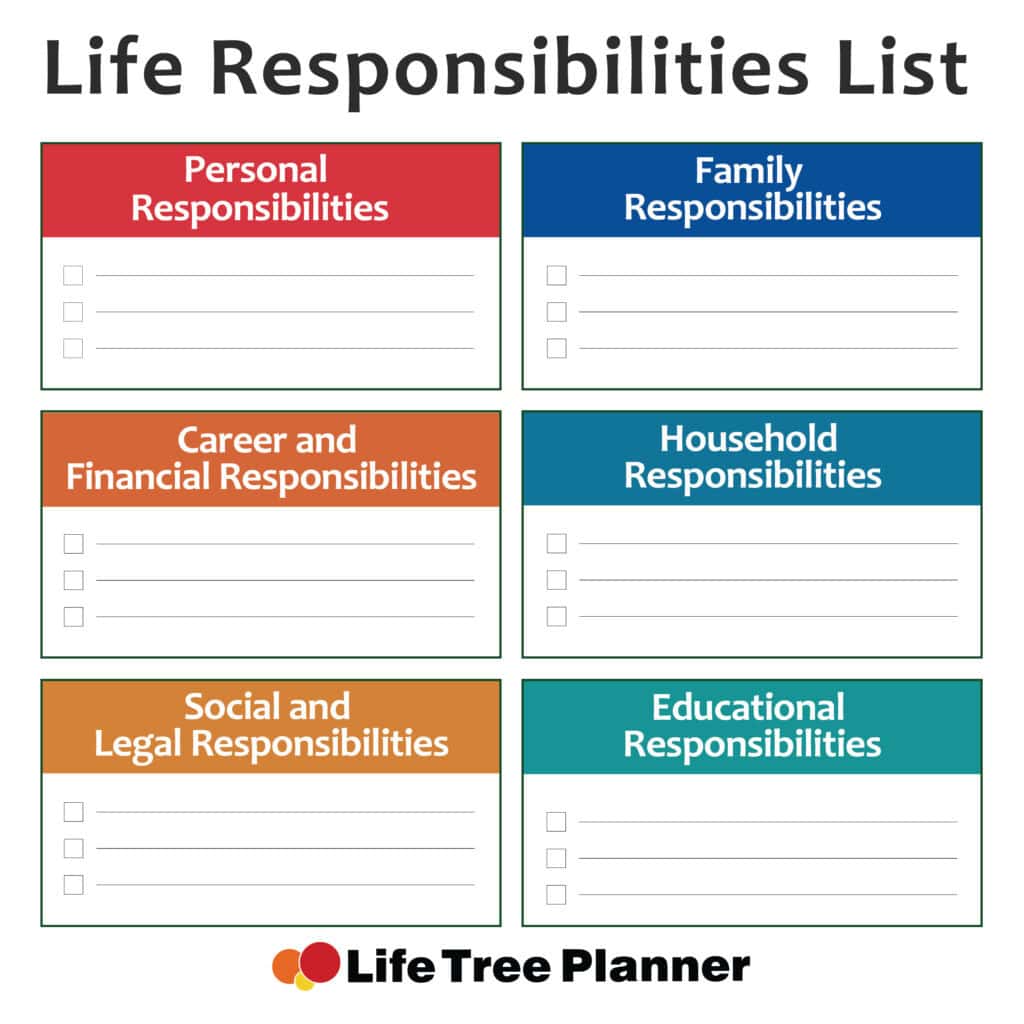
Feeling Overwhelmed by Life’s Demands? Balancing personal, family, career, and social responsibilities can be a daunting task. Are you struggling to keep track of your duties while managing your goals and aspirations?
You juggle multiple responsibilities every day, and it can often feel like a never-ending list. But you’re not alone; many face the challenge of organizing their lives effectively.
We’re Here to Help You Navigate Your Responsibilities. Our guide will show you how to create a Life Responsibilities List that brings clarity and balance.
In this article, we’ll break down how to craft a comprehensive Life Responsibilities List with 60 examples—covering 6 categories such as personal, family, career, and social duties.
After Reading This Article, you’ll be able to take control of your responsibilities and achieve a more balanced, fulfilling life.
Your journey to mastering life’s demands starts now.
Here are 6 categories of a Life Responsibilities List:

- Personal Responsibilities: Managing your own health, such as exercising regularly and maintaining a balanced diet.
- Family Responsibilities: Providing emotional support and care for family members, such as helping with children’s school activities.
- Career and Financial Responsibilities: Handling job duties and managing personal finances, such as budgeting and saving for retirement.
- Household Responsibilities: Taking care of home maintenance tasks, such as cleaning and organizing living spaces.
- Social and Legal Responsibilities: Adhering to laws and contributing to community welfare, such as voting and volunteering.
- Educational Responsibilities: Staying committed to learning and skill development, such as completing coursework or attending professional development sessions.
See also Top 10 Responsibilities of a Father: Core Duties for a Dad
What Are Life Responsibilities?
Life responsibilities encompass the duties and obligations that every human being must manage to maintain a balanced and fulfilling life. As adults, personal responsibility includes managing one’s own finances, budgeting, and paying taxes.
In personal lives, this extends to caring for family members and maintaining a healthy work-life balance. Taking control of your own life means realizing the importance of mental health, making sound decisions, and handling daily tasks.
These responsibilities play a significant role in shaping one’s life, as they ensure stability and fulfillment. By taking ownership of these aspects, human beings can better navigate the complexities of life and pursue their desires with confidence.
Importance of Having a Life Responsibilities List

Having a Life Responsibilities List is crucial for wellness and effective life planning. It helps human beings maintain personal responsibility by managing their own finances, taking care of family members, and planning for the future.
By clearly outlining duties, it provides a solid understanding of priorities, ensuring that human beings can handle their own money and obligations with confidence, leading to a more balanced and fulfilling life.
Here are 10 benefits of having a Life Responsibilities List:
- Clarity of Purpose: Clearly outlines what needs to be done, helping you focus on important tasks.
- Increased Productivity: Boosts efficiency by organizing tasks and setting priorities.
- Improved Time Management: Helps allocate time effectively across various responsibilities.
- Stress Reduction: Reduces anxiety by providing a clear plan and reducing mental clutter.
- Enhanced Financial Control: Assists in managing your own money and budgeting more effectively.
- Better Goal Achievement: Aligns daily activities with long-term goals and objectives.
- Stronger Family Relationships: Ensures family responsibilities are managed, fostering better relationships.
- Increased Accountability: Promotes personal responsibility by keeping you accountable for your tasks.
- Balanced Lifestyle: Helps maintain a healthy work-life balance by allocating time for both work and personal life.
- Personal Growth: Encourages continuous improvement and self-discipline by tracking and managing responsibilities.
Life responsibilities can typically be divided into these 6 categories:
1. Personal Responsibilities

Personal responsibilities involve managing various aspects of life to ensure well-being and fulfillment. This includes maintaining a Self-Care Night Routine and using a Self-Care Planner to prioritize health and happiness.
It also encompasses tasks like developing career goals, taking care of children, and contributing to the community. By integrating a self-love checklist and addressing these areas consistently, individuals can achieve balance and growth in their lives, leading to overall personal development and satisfaction.
Here are 10 examples of Personal Responsibilities:
- Community Service: Volunteering or participating in local events.
- Date Night: Regularly scheduling time with your partner.
- Spa Day: Enjoying a day of relaxation and self-care.
- Exercise Routine: Committing to regular workouts.
- Meal Planning: Organizing meals for healthy eating.
- Financial Budgeting: Managing and tracking personal finances.
- Career Development: Attending workshops or courses.
- Self-Care Rituals: Practicing activities like deep meditation.
- Home Maintenance: Keeping up with household tasks.
- Family Time: Spending quality time with loved ones.
2. Family Responsibilities

Family responsibilities are crucial for having strong family bonds and ensuring effective management of household tasks. These responsibilities include engaging in family bonding activities, guiding children through their development, and managing finances.
Parents must constantly work to teach kids important life skills and responsibilities.
Understanding the significance of these tasks helps families develop a strong sense of unity and personal growth, countering any opposition or challenges. By prioritizing family responsibilities, individuals realize their role in supporting and nurturing their loved ones.
Here are 10 examples of family responsibilities:
- Long-Term Planning: Making decisions for future needs such as 5-Year Goal Examples.
- Childcare: Daily care and supervision of children.
- Household Chores: Cleaning, cooking, home maintenance, and weekly chores list.
- Financial Management: Budgeting and handling expenses.
- Family Activities: Planning and participating in bonding activities.
- Health Care: Managing medical appointments and well-being.
- Education Support: Assisting with homework and school activities.
- Emotional Support: Providing comfort and encouragement.
- Transportation: Driving family members to appointments and activities.
- Crisis Management: Handling emergencies and urgent issues.
3. Career and Financial Responsibilities

Career and financial responsibilities are crucial aspects of adult life. Managing your career effectively involves honing skills, setting goals, and striving for growth. Financially, developing strong money management skills is key to controlling your wealth.
This includes budgeting, paying bills, handling taxes, and planning for the future. Regularly monitoring these aspects each week helps ensure financial stability and supports your long-term desires.
Mastering these responsibilities is vital for maintaining a balanced and successful life.
Here are 10 examples of Career and Financial Responsibilities:
- Expense Tracking: Monitoring and adjusting daily spending.
- Budgeting: Creating and following a monthly budget.
- Saving for Retirement: Contributing to retirement accounts.
- Paying Taxes: Filing and paying taxes on time.
- Managing Investments: Overseeing investment portfolios.
- Debt Management: Paying off loans and credit cards.
- Career Development: Pursuing further training or certifications.
- Networking: Building professional relationships.
- Having Own Business: Managing and growing a personal business.
- Emergency Fund: Saving for unexpected expenses.
4. Household Responsibilities

Household responsibilities encompass a range of duties necessary for maintaining a well-functioning home. For adults, this includes managing chores and balancing responsibilities like budgeting and family care.
Stay-at-home moms responsibilities often handle daily tasks, while teenagers might be assigned age-appropriate chores for teenagers. Fathers, too, have key responsibilities in providing support and guidance.
Effective communication and clear expectations help everyone stay aware and involved. By imagining these duties as part of living life, individuals can better manage their roles and make informed decisions about their household responsibilities.
Here are 10 examples of Household Responsibilities:
- Family Scheduling: Organizing family activities and appointments.
- Cleaning: Tidying up and maintaining cleanliness.
- Meal Preparation: Cooking and planning meals.
- Laundry: Washing and organizing clothes.
- Budget Management: Handling finances and paying bills.
- Childcare: Caring for and supervising children.
- Home Maintenance: Performing repairs and upkeep.
- Grocery Shopping: Buying food and supplies.
- Pet Care: Feeding and caring for pets.
- Waste Management: Handling trash and recycling.
5. Social and Legal Responsibilities

Social and legal responsibilities involve fulfilling duties that impact both personal and societal well-being. Financial management techniques, such as budgeting and saving, are crucial for the responsible handling of money.
On a personal level, being honest and managing finances effectively shows full responsibility. At work, upholding integrity and fulfilling job obligations are essential.
Society relies on individuals to practice good habits and contribute positively. Parents, too, have a role in setting examples and instilling responsibility in their children. These practices ensure a balanced approach to personal and social duties, making sense for overall well-being and societal function.
Here are 10 examples of social and legal responsibilities:
- Reporting Crimes: Informing authorities about illegal activities.
- Community Service: Volunteering for local charities.
- Environmental Stewardship: Recycling and reducing waste.
- Respecting Diversity: Promoting inclusivity and respect.
- Ethical Consumerism: Supporting Fair Labor Practices.
- Civic Engagement: Voting and participating in local governance.
- Adhering to Laws: Following traffic and business regulations.
- Paying Taxes: Filing tax returns accurately.
- Contractual Obligations: Honoring agreements and contracts.
- Respecting Intellectual Property: Avoiding plagiarism and copyright infringement.
6. Educational Responsibilities

Educational Responsibilities are crucial for personal development and achieving career goals. For adults and college students, this involves setting clear goals, managing course tasks, and adhering to schedules.
By actively engaging with goal-setting books and developing a structured plan, individuals can control their learning process and stay on track. This constant awareness and effort ensure that educational responsibilities are met, ultimately contributing to a successful and fulfilling life.
Regularly assessing progress and staying motivated are key to managing these responsibilities effectively.
Here are 10 examples of Educational Responsibilities:
- Reflecting: Evaluating and adjusting study habits regularly.
- Attending Classes: Regularly going to lectures and participating in discussions.
- Completing Assignments: Submitting homework and projects on time.
- Studying: Dedicating time to review and prepare for exams.
- Group Work: Collaborating effectively on group projects.
- Seeking Help: Using tutors or study groups when needed.
- Managing Time: Creating and following a study schedule.
- Setting Goals: Establishing academic and career objectives.
- Academic Integrity: Avoiding plagiarism and cheating.
- Staying Informed: Keeping up with course requirements and deadlines.
See also Setting Life Goals at 70: 60 Ideas for a Meaningful Future
Life Responsibilities List: A Recap

Creating a Life Responsibilities List is essential for personal growth and effective living. As adults, we are taught to manage our own lives and make decisions based on personal responsibility. This includes handling financial matters, such as budgeting and spending money wisely.
The concept of personal responsibility is akin to following a modern version of the Ten Commandments for living a balanced life. Each task, from maintaining a job to developing good habits, plays a crucial role in managing responsibilities. Imagine a life where every decision is well-considered and every task is handled efficiently.
By constantly evaluating and adjusting our approach, we can better manage responsibilities and create a fulfilling life. This method makes sense, ensuring that we are prepared for both expected and unexpected challenges.


